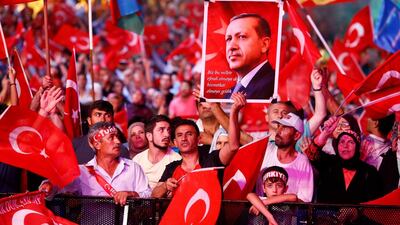Arabs were overjoyed about the failure of last month’s coup attempt against Turkish president Recep Tayyip Erdogan, according to an Arabic-language commentator.
Writing in the pan-Arab daily Asharq al-Awsat, Saudi columnist Tawfiq Al Saif said there were two main reasons for this.
In part it was because Arabs are generally against coups. The other reason was because they support democracy in Turkey “regardless of their position vis-à-vis the ruling party or its leaders”.
He said it was important to examine the language used in expressing this attitude.
“There is an omnipresent – albeit implicit – acknowledgement of the virtues of democracy, a glorification of civil liberties and a vilification of conquering as a means to take over power,” he wrote.
“It has not yet reached the level of complete adoption of the democratic discourse and of total rejection of violence and beliefs that support the monopolisation of power, but it sure is an indication that the religious movement Al-Manhaj Al-haraki (dynamic Islam) is gradually letting go of its archaic historic legacy.
“Arabs have yet a long way to go towards a complete transition in their political culture, but for observers like myself, these small successive transitions are proof of what we believe is the light at the end of the tunnel,” he concluded.
Another columnist noted that Arab religious groups were quick to align with Mr Erdogan and his Justice and Development Party once the government announced that it had regained control and the coup had failed
"The alignment of Arab Islamists with Mr Erdogan and his party poses a number of issues related to the assessment of political and religious awareness," said Idriss Al Kanboury in the London-based pan-Arab newspaper Al-Arab.
He said that such an alignment was not new but it was different this time as Islamists had shaken off the reservations they had expressed about the Hizmet (Gulen) movement following its conflict with the ruling party in 2013 after scandals of corruption “touched the entourage of Mr Erdogan”.
Back then, Islamists did not pay heed to these scandals and they played along with the ruling party although they made sure to mention that they were against corruption and with the reform and its standard-bearers, Al Kanboury noted.
“The truth is that Arab Islamists had no other choice but to stand by the ruling party, even though its opponent is also Islamic albeit not being particularly political,” he added.
“The party in power can offer what a movement out of power cannot – even if the latter is right.
“For Islamists, being right and having power is one of those equations that have got religion and politics in theoretical and moral trouble since the very beginning.
“What happened when the corruption scandals broke out happened again following the failed coup, but the problem is that Islamists did not just condemn the coup this time like many parties both inside and outside Turkey did.
“Rather, they went on to commend Mr Erdogan’s policies – namely arresting hundreds of thousands merely because they were members of the Gulen movement and closing down dozens of Hizmet institutions and media platforms, not to mention the state of fear that spread throughout Turkey,” the writer said.
He said that the religious groups had only heard the case of one party in the conflict and took its side without verifying the news.
translation@thenational.ae

